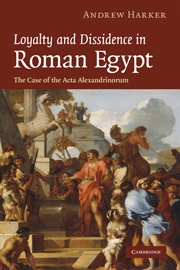Book contents
- Frontmatter
- Contents
- Note on abbreviations
- Chapter 1 Introduction
- Chapter 2 The embassies to Gaius and Claudius
- Chapter 3 The Acta Alexandrinorum: Augustus to the Severans
- Chapter 4 The Acta Alexandrinorum: The historical background
- Chapter 5 Between loyalty and dissent: The Acta Alexandrinorum and contemporary literature
- Chapter 6 Conclusion
- Appendix I Editions of the Acta Alexandrinorum and related texts
- Appendix II The status of the Alexandrian Jews
- Appendix III The ‘dubious or unidentified’ fragments
- Bibliography
- Index
Appendix II - The status of the Alexandrian Jews
Published online by Cambridge University Press: 22 September 2009
- Frontmatter
- Contents
- Note on abbreviations
- Chapter 1 Introduction
- Chapter 2 The embassies to Gaius and Claudius
- Chapter 3 The Acta Alexandrinorum: Augustus to the Severans
- Chapter 4 The Acta Alexandrinorum: The historical background
- Chapter 5 Between loyalty and dissent: The Acta Alexandrinorum and contemporary literature
- Chapter 6 Conclusion
- Appendix I Editions of the Acta Alexandrinorum and related texts
- Appendix II The status of the Alexandrian Jews
- Appendix III The ‘dubious or unidentified’ fragments
- Bibliography
- Index
Summary
The status held by the Alexandrian Jews, the primary cause of the violence between Greeks and Jews in Alexandria, was a contentious issue in antiquity and remains controversial among modern scholars. A major problem is that the full details about Augustus' settlement of Egypt have not survived. Augustus imposed a social hierarchy in Egypt with political, administrative, fiscal and legal privileges for the highest social classes. Roman citizens and the citizens of the Greek cities in Egypt (Alexandria, Ptolemais, Naucratis and later Antinoopolis) topped this social hierarchy, and enjoyed numerous privileges, including exemption from the poll tax. The residents of the nome capitals, the metropolites, paid a slightly reduced rate of poll tax, but the inhabitants of the chora, classed simply as ‘Egyptians’, formed the lowest freeborn status group. The Jews in the chora were also legally classed as ‘Egyptians’. How the large Jewish community at Alexandria, around a fifth to a third of the population according to modern estimates, fitted into this civic stratification is unclear.
The ancient evidence is polemical. Jewish writers, such as Philo and Josephus, speak in terms which would imply that the Jews enjoyed Alexandrian citizenship and were therefore among the highest social group in the province. The Greek writers, such as Apion, Chaeremon and the authors of the Acta Alexandrinorum, vehemently deny this claim, and instead equate the Jews to the ‘Egyptians’, i.e. the lowest social group in the province. The ‘documentary’ evidence does little to illuminate the situation.
- Type
- Chapter
- Information
- Loyalty and Dissidence in Roman EgyptThe Case of the Acta Alexandrinorum, pp. 212 - 220Publisher: Cambridge University PressPrint publication year: 2008

